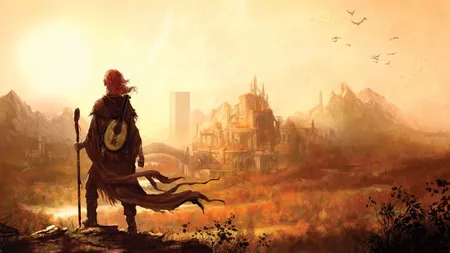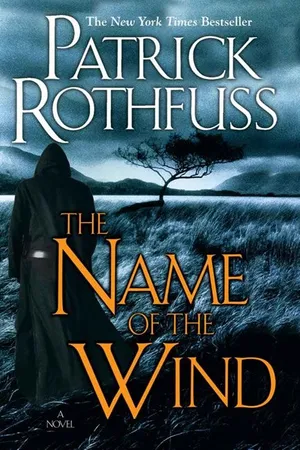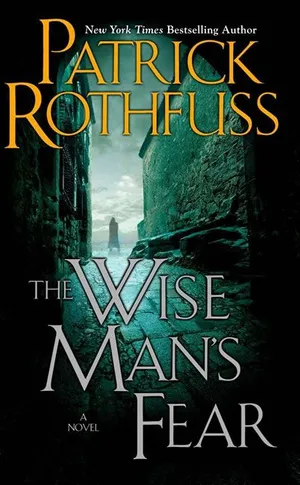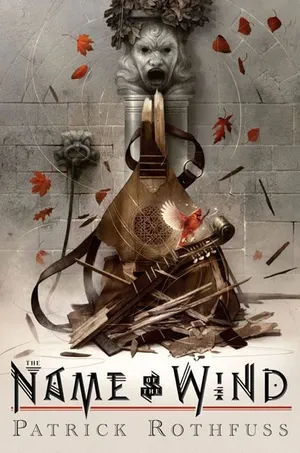Books I Love: The Kingkiller Chronicle
TL;DR: It’s no exaggeration to say that Patrick Rothfuss’ The Name of the Wind might be my favorite book of all time. It’s in competition with heavy hitters like Hitchhiker’s Guide, The Lord of the Rings,...

It’s no exaggeration to say that Patrick Rothfuss’ The Name of the Wind might be my favorite book of all time. It’s in competition with heavy hitters like Hitchhiker’s Guide, The Lord of the Rings, and Ringworld. Books I come back to time and again, re-reading compulsively, like comfort food.
I can’t remember now how I first heard of it. Likely from a book review on io9 or some site like that. What I vividly remember was reading a short excerpt where the main character, Kvothe, introduces himself:
I have stolen princesses back from sleeping barrow kings. I burned down the town of Trebon. I have spent the night with Felurian and left with both my sanity and my life. I was expelled from the University at a younger age than most people are allowed in. I tread paths by moonlight that others fear to speak of during day. I have talked to Gods, loved women, and written songs that make the minstrels weep.
You may have heard of me.
The audacity of that introduction fascinated me. Especially the cheeky tone of “You may have heard of me.” It felt like the opening scene of Conan the Barbarian, but with a nod and wink to the audience. I was hooked immediately.



On the right is the beautiful tenth anniversary edition. Look at that artwork! Kvothe (pronounced like “quothe”) is living in hiding but has been tracked down by the Chronicler, a sort of roving biographer who has learned his secret. He convinces Kvothe to share his story, and from that point, the book is mostly his own narration. Hence the introduction.
There are many reasons to love these books, and if you read a bunch of reviews, you’ll see other people talk about how great the characters and plotting are. I wholly agree, but I’m not particularly well equipped to discuss the literary merits. Instead, I want to talk about the world the books are set in.
Like The Lord of the Rings, these books work particularly well because you can tell you’re seeing only a small slice of a vast and vividly imagined world. There are jokes and aphorisms that demonstrate a rich history. Characters from different lands have their own cultural quirks that make them instantly recognizable. Because Kvothe is a musician, he collects poems and songs and literary references with a hunger to match any scholar. There are board games and politics and scholarly traditions, all of which help to cement the feeling that you’re visiting another world, not just a cheaply wallpapered version of our own.
My absolute favorite part is the magic system. The university that Kvothe mentioned is the University. It’s where you go to study magic. There are several styles, or “schools” of magic, ranging from practical to dangerous to abstract. Kvothe dabbles in them all, enough for us to see that each has a defined set of rules. This is not hand-wavey magic like in Harry Potter, this feels more like science, with clear limitations and costs and courses of study.
And, of course, like any good narrator, we find out that Kvothe is absolutely full of shit. Half the fun of the books is getting to one of the fantastic things he mentioned in his introduction and finding out how it really happened. Kvothe is a trickster, not a warrior. He’s more like Odysseus or Loki than Thor or Conan.
At the moment, there are just two books in the planned trilogy, with a third eagerly awaited by a hoard of fans. Based on the pace of the first two books, it’s hard for me to imagine how he’ll wrap up the story in just one more book, but at this point, that’s part of the fun. Kvothe (and Rothfuss) will surely conclude his story in a surprising way.
(Oh, and if you enjoy the books, I’ve got great news. Rothfuss is working on a movie adaptation, and he got Lin-Manuel Miranda to write all the music!)